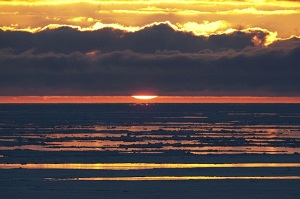China Blocks Protection of Antarctica's Waters:
 Some 1.2 million people asked the 25 member governments of the Commission on the Conservation of Antarctic Marine Living Resources (CCAMLR, composed of 24 countries and the EU) to take action during their annual meeting this week to conserve Antarctic marine ecosystems. Most of them answered this call and were prepared to work on proposals for marine protected areas and reserves in the ecologically important Ross Sea and East Antarctic regions. Ultimately, however, the Antarctic conservation aspirations of the majority of CCAMLR members were reportedly blocked by just a few countries, under the leadership of China.
Some 1.2 million people asked the 25 member governments of the Commission on the Conservation of Antarctic Marine Living Resources (CCAMLR, composed of 24 countries and the EU) to take action during their annual meeting this week to conserve Antarctic marine ecosystems. Most of them answered this call and were prepared to work on proposals for marine protected areas and reserves in the ecologically important Ross Sea and East Antarctic regions. Ultimately, however, the Antarctic conservation aspirations of the majority of CCAMLR members were reportedly blocked by just a few countries, under the leadership of China.CCAMLR requires consensus on all decisions, which allows a small minority to stifle the aims of the majority.
Since 2009, CCAMLR members and observer organizations have worked constructively to develop a system of marine protected areas (MPAs) in the Southern Ocean, which surrounds Antarctica. CCAMLR members pledged to develop this network to help fulfill the targets set by the 2002 World Summit on Sustainable Development (WSSD). The WSSD targets call for countries around the world to establish representative networks of MPAs throughout the world’s oceans by 2012, and CCAMLR agreed that it would create such a network in the Southern Ocean by that time. This pledge was followed up with intensive scientific analysis, special workshops, and targeted diplomatic engagement.
At last year’s CCAMLR meeting, experts advised that the science on the ecosystems of the Ross Sea and East Antarctica was sufficient to move forward with creating MPAs in those areas. In the case of the Ross Sea, there is a long, impressive record of important scientific research, and the ecosystem itself has been identified as one of the most pristine marine ecosystems remaining on the planet. In fact, it’s difficult to imagine a more ideal candidate for protection. East Antarctica is a vast region with many significant populations of seabirds and marine mammals plus unique bioregions – again, an obvious area to protect.
Nevertheless, the meeting closed on Thursday without any new MPAs designated, to the disappointment of the countries that had put forward proposals, the environmental community, and those 1.2 million people. So what happened? It seems some countries are putting economic gain over conservation, even though CCAMLR is first and foremost a conservation body (as its name implies). According to a report in The Australian, a major Australian newspaper, China blocked all MPA proposals this year due to its desire to maintain access to fishing. Interestingly enough, China does not currently fish in any of the areas proposed for MPAs, meaning that it would be prioritizing potential economic gain over certain conservation benefit.
CCAMLR’s meetings aren’t open to the public. An official meeting report is published but it is not a transcript of the proceedings, so many comments will not be reflected in the official record. However, other countries known to be skeptical of MPAs include Russia and the Ukraine. Science and conservation in the interest of the broader public is getting trumped by economic concerns in service of a few. The recalcitrant countries are not convinced by reams of scientific data from experienced researchers, and they are not too concerned about living up to their own promises. The result is that our oceans don’t get the protections they need, whether in the Southern Ocean or anywhere else.
The Southern Ocean is relatively remote, and fishing activity is less intense than it is in many parts of the world. If countries can’t protect the marine ecosystems here, then what hope is there for the rest of the world?
CCAMLR members have agreed to continue working on MPAs in advance of their 2013 meeting. The question remains whether all countries are truly willing to live up to their commitments and give the amazing biodiversity of the Southern Ocean the protection it deserves.
You can return to the main Market News page, or press the Back button on your browser.

